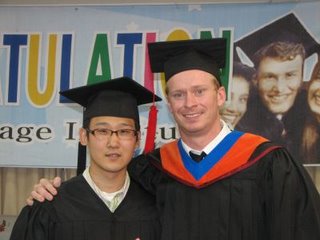Saturday, November 04, 2006
Teaching Does Have Its Advantages


Is it harder to be a student or a teacher?
If you had asked me that question in my senior year of high school, I probably would have blinked at you momentarily and maybe yawned. I was, after all, a high school student still trying to recover his energy after having listened to multiple semi-geriatric-aged individuals in dress shirts with too many buttons explain calculaic vocabulary for 90 minutes at a time.
Had you written that question down for me and waited for me to answer sometime after I took a nap, I would probably have told you that being a student is harder. My theorem at the time rested on three principles.
The first of these was that teachers have to give assignments to students, a process which takes upwards of four minutes to devise, implement and relate to a room full of not-quite vicenarians who are mostly hoping that the course will somehow make them better prepared for college. It is, of course, vitally important that the student be thoroughly-primed for the experiences he or she will face in the next year, including, but not limited to: attending important classes, switching those classes for something less challenging like racquetball, choosing a major, changing their major, and then simply giving up and attempting to propel their blood alcohol percentage upward in a building adorned with Greek characters.
The second is that teachers are given liberty to choose their subject material, and it’s the students’ responsibility to actually remember what important things were said during the lecture. Even if the teacher spent the entire duration class talking about complex subjects with all the enthusiasm of a character in a George Romero movie on Vicodin, the student is still supposed to remember the important details, because the teacher can always point to the classmate in the front row as an example of someone who understood the topic perfectly. This always shames and discredits those who missed the important details; even though said classmate in the front row is actually a freak of nature who’s sky-high IQ will one day devise a plan enabling him to talk to women his age in person.
Finally, the third point is that teachers enjoy the vantage position at the front of the class room. From here, they can enforce the strict “no-talking” rule, which applies to every student in the room, except for those who don’t care that there’s a no-talking rule. In between the freaks-of-nature-in-the-front-row and those who don’t care about the teachers’ rules and are really just waiting for class to end so they can go back to enjoying inhalants are those students who want to understand the teacher and must try hard to do so. Teachers do not endear themselves to this silent majority when they enforce class rules through the tri-pronged strategy of 1) telling everybody to be quiet, 2) telling everybody to be quiet again, and 3) deciding that the best way to punish the five misbehaving students is to make the entire class write “I will be quiet while the teacher is talking” 500 times.
For the past year here in Korea, I have found myself on the other side of the classroom, teaching English as a second language. My students can be narrowed down into two groups: those who are adults attempting to keep pace in a nation whose job market seems to require applicants to be bilingual and have Java programming certification in order to be a server at Outback Steakhouse, and children who are in class 18 hours a day preparing for a time when the job search will apparently be even keener.
Since starting, I have discovered that I no longer enjoy certain advantages that come with being a student. As a student, I was able to periodically tune out the words while sitting at my desk and drawing exaggerated pictures of my teachers’ less-flattering mannerisms. When the class is yours to lead, such “space out” time no longer exists.
As a student, occasionally being late or absent from class meant a little catch up work to do, as well as a warning from the teacher that, say, six-seven more and I might be looking at the loss of a letter grade. When the class is your responsibility, the occasional tardiness can result in less pay, and a warning that it may be up to 100 percent less.
As a student, if a class was simply not enjoyable or far outside my realm of interest, I could simply say, “Well, at least it’s not part of my major” and strive for a B-. As a teacher, every student who does not grasp the lesson or gives up along the way begins to feel like a failure, one you will always wonder if you could have prevented had you tried a little harder.
However, I’ve also discovered new advantages of being a teacher since I started working at the Seventh-day Adventist Language Institute. In the past four months, three of my upper-level students graduated from our program after passing the final interview in Seoul. The standards for these interviews are such that many of those I went to middle school with would probably not pass, and only about 1 percent of those who enroll in a language institute actually graduate from its courses.
What I’ve learned through this is that, while student gets to experience the thrill of graduation a few times in their life, a good teacher gets to feel it over and over again.
Subscribe to Comments [Atom]
